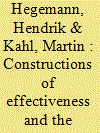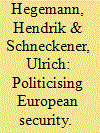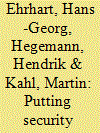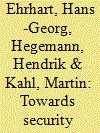|
|
|
Sort Order |
|
|
|
Items / Page
|
|
|
|
|
|
|
| Srl | Item |
| 1 |
ID:
137168


|
|
|
|
|
| Summary/Abstract |
This article argues that counterterrorism effectiveness is a distinct, discursive construction that politicians use to offer a rationalization of measures adopted under conditions of inherent uncertainty. Even in the face of multiple limits of knowability, decision makers need to offer “rational” justifications complying with persisting expectations of “evidence-based” policy and sound deliberation in modern societies. This article develops a new perspective on the political role of counterterrorism effectiveness highlighting the symbolic importance of knowledge claims and prevailing standards of modern rationality. It illustrates its arguments through a case study on the justification of biometric passports as an effective counterterrorist tool.
|
|
|
|
|
|
|
|
|
|
|
|
|
|
|
|
| 2 |
ID:
166745


|
|
|
|
|
| Summary/Abstract |
Security provision in and by the EU has become an issue of increasing public interest and controversy. There are diverse and growing demands and critiques from different political camps towards the EU while EU institutions, in turn, utilise their security function as a resource for authority construction and self-legitimation. More recently, European security has also become intertwined with contemporary “crises” that turned it into an arena for the negotiation of fundamental conflicts, often revolving around questions of identity and sovereignty. This paper argues that these developments represent a significant change of European security and its politics that existing approaches linking the field to depoliticisation cannot adequately capture. To fill this gap, this paper suggests applying a politicisation perspective that, so far, has focused on the European integration project as such or the “Eurozone crisis” to the purportedly special security field.
|
|
|
|
|
|
|
|
|
|
|
|
|
|
|
|
| 3 |
ID:
128239


|
|
|
|
|
| Publication |
2014.
|
| Summary/Abstract |
Security governance has featured prominently in recent debates about fragmentation, informalization, and privatization in the increasingly diverse field of security policy. It has inspired much valuable research. Yet, there are not just very different conceptual understandings of security governance; there is also a lack of clarity regarding its empirical manifestations and normative connotations. After a decade of research, the special issue therefore puts security governance to the test and scrutinizes its analytical and political pitfalls and potentials. This editorial briefly reviews the rise of security governance, identifies central conceptual, empirical, and normative challenges that need to be addressed, and introduces the individual contributions to this special issue.
|
|
|
|
|
|
|
|
|
|
|
|
|
|
|
|
| 4 |
ID:
128234


|
|
|
|
|
| Publication |
2014.
|
| Summary/Abstract |
This article argues that security governance can and should be reframed as a critical tool that enables us to understand and reappraise concrete practices of security provision. Security governance needs to move beyond the functional mapping of different governing arrangements and the presumption that security governance leads to effective and legitimate problem-solving in a quasi-automatic manner. In this article, we propose a framework that identifies the essential characteristics of security governance and turns them into critical questions with the aim to reveal persisting frictions and dilemmas. First, we trace the rise of security governance as concept and practice over the past decade and identify its central characteristics with regard to prerequisites, structures and consequences. Second, we reframe the core characteristics of security governance into critical questions and thereby develop an understanding of security governance as a critical tool. Finally, we illustrate the relevance of this approach with examples from EU security governance.
|
|
|
|
|
|
|
|
|
|
|
|
|
|
|
|
|
|
|
|
|